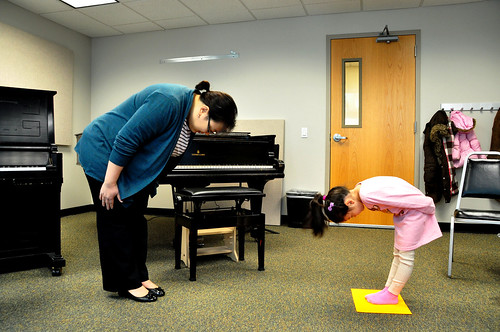
Children learn fundamental life lessons through music programs offered by Boyer School of Music at the Center City Campus.
On Saturday mornings, when some students are sleeping in after a full week of classes, Temple University Center City is alive with music students.
On the fifth floor sits the Temple Music Preparatory Center for Lifelong Learning and Gifted Young Musicians. The center provides lessons for students from a variety of ages, including three-year-old Juhlai Dixon.
Dixon was one of the youngest students at TUCC to attend her Pre-Twinkle piano class last Saturday morning. She spent the class jumping to the tempo of music, and demonstrating knowledge of her “do-re-mis.”
But as she sat at the piano with her instructor, Zoe Park, “Miss Zoe,” she showed an unexpected maturity for an average three-year-old. Dixon sat upright at the piano with her hands folded on her lap, and only when instructed would she go on to play the notes of “Twinkle Twinkle Little Star.”
“I wanted to enlighten her to music,” Dixon’s mother, Jamia Dixon, said. “She has her cat piano, we also got her a guitar. Now she has a pair of drums.”
Park is one of the instructors of the Pre-Twinkle piano class at the Center City Music Prep programs through Boyer School of Music. As a master’s student from Boyer, Park takes her skills in piano and music pedagogy and shares them with students in the class.
If a student requests a song, she will play it for them on the piano to encourage cooperation. Park explained that the Suzuki method, which she employs in the class, is a bit different from more technical methods of teaching children piano.
“This class is the stepping stone to individual lessons, and they are learning solely through observation and listening,” Park said. “A group class like this allows the students to motivate one another. They acquire the confidence they need for the next level.”
This “next level” is taught by instructors like Emily Jennings.
Jennings, a 2011 alumna from Boyer’s pedagogy program, takes the students from Pre-Twinkle and introduces them to written music. She uses white boards, much like an art class, to visually have her students understand the relationship between tone and the note written on the staff.
With the Suzuki piano method, Juhlai Dixon is getting a different kind of attention to her enlightened exposure of music–natural exposure.
“I was at first skeptical of the Suzuki method, I was introduced to it at Temple,” Jennings said. “But then I saw it worked for many people–now I’m a Suzuki teacher.”
“With the Suzuki method, there is no pressure, you learn more naturally,” said one of the student’s mothers, Monica Padilla. “My daughter, Leiliani, is committed to the piano. She practices and is always finding something new to play.”
Padilla said that her seven-year-old daughter now challenges herself to play what she hears. The very idea of learning to play by ear is how the Suzuki method developed. But the Suzuki method and its potential to teach students how to play naturally is not the only perk to a class with the Music Prep programs.
“Leiliani is top of her math class, and music helps her with academics,” Padilla said.
Padilla is not the only mother who believed in the powerful connection between music and academia. Grace Polito’s mother, in Park’s Pre-Twinkle class, also emphasized music as a stepping stone for growth and maturity.
“I truly believe that music helps in brain development,” Polito said. “And a class like this shows many other things. [My daughter] has become more confident. She is more patient and more mature after a class like this.”
Boyer also offers a Community Music Scholars Program held at Presser Hall on Main Campus.
“It is knowledge you want to share, and we are an access point for the people in the community,” Director Mark Huxsoll said.
The program offers classes to interested adults, senior citizens and younger students. Approximately 90 percent of the student body within Boyer’s Music Prep program are students under 18 years old.
“I really like music, I want to be a musician,” said five-year-old Livia Stites, with her violin strapped on her back.
Nicole Welk can be reached at nicole.welk@temple.edu.



Be the first to comment